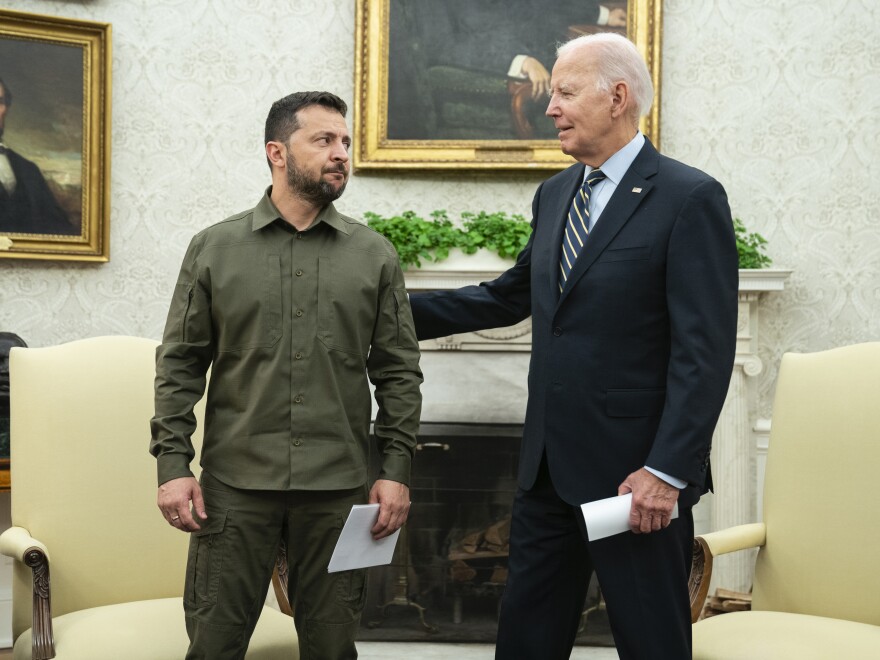Updated October 19, 2023 at 8:53 PM ET
President Biden gave a rare Oval Office address Thursday night to make the case that it is in Americans' best interests to hike funding for Israel after the deadly Hamas attack — and to support additional funding for Ukraine, embroiled in its long fight against Russia.
During the roughly 15 minute speech, Biden drew a connection between Russia and the Palestinian militant group Hamas, which attacked Israel on Oct. 7 and sparked the current war.
"They both want to completely annihilate a neighboring democracy, completely annihilate it," Biden said, noting that Iran supports both President Vladimir Putin and Hamas.
To pay for that support, Biden said he would send a formal request for funding to Congress on Friday. The fate of the proposal, which is expected to be billions of dollars, is unclear. For one thing, the Republican-led House of Representatives does not currently have a speaker, making it impossible to consider any such funding package. A growing number of Republicans also are wary of increasing spending for Ukraine in particular.
Biden said he knows Americans wonder why they should spend money on faraway conflicts. But he warned of more "chaos, death and destruction" and ultimately higher costs for America if Hamas or Putin don't pay a price for their actions. He said other aggressors would be emboldened in the Indo-Pacific or Middle East.
The Oval Office backdrop is a signal of the gravity that Biden places on these national security matters. The speech was only the second time he has spoken to the nation from behind the Resolute Desk; the first was in June, after the debt ceiling crisis was averted.
Thursday's remarks came just after Biden returned from a whirlwind trip to Tel Aviv, where he pressed Israeli Prime Minister Benjamin Netanyahu and his war cabinet on their military strategy to fight Hamas.
And as he did on that visit, the president walked a fine line in his address, pronouncing his unequivocal support for Israel while also expressing concerns about civilians in Gaza. He was again adamant that Israel has a right to defend itself, and pledged he would ask for "an unprecedented support package" for Israel's defense.
Biden also urged Americans to denounce antisemitism, Islamophobia and other forms of hate like the kind that fueled the murder of a young Palestinian-American boy outside Chicago.
It's Biden's second try to get more Ukraine funding from Congress
Even before the Oct. 7 Hamas attack on Israel, Biden had been planning a speech to Americans about his foreign policy priorities.
He had said he was worried that Congress would undermine his promise to back Ukraine in its fight against Russia. In its most recent government funding bill, Congress failed to include $24 billion to keep military and economic aid flowing to Ukraine until the end of the year.
The White House faces two hurdles on Ukraine aid: waning public support — primarily among Republicans — and a still-unfilled role of speaker of the House. Without a speaker, it's unlikely the Republican-controlled lower chamber can pass spending bills.
Biden spoke to Ukrainian President Volodymyr Zelenskyy on Thursday ahead of of his speech, the White House said.

Biden could push for other national security priorities, too
In his formal request to Congress, it's possible Biden could ask for more funding for Taiwan, as well, though he did not raise this in Thursday's remarks.
He had also previously asked Congress for $4 billion in funding to deal with fentanyl trafficking and issues at the southern U.S. border, but that money also was left out of this fall's funding bill. Both funding for Taiwan and border security are elements some Republican leaders in Congress have shown support for.
"In the coming days, it will be the Senate's responsibility to take strong and decisive action to put support behind Israel's self-defense, equip Ukraine for victory ... and help Taiwan deter growing threats," Senate Minority Leader Mitch McConnell said Thursday.
Combining several different issues into one bill could be a risky move in a divided Congress, but Sen. Dan Sullivan, R-Alaska, told NPR it could help broaden support for the funding.
"I'm hopeful that it actually broadens the support for members of Congress who are focused on different issues," Sullivan said. "And as you know, a lot of times in the Congress, things happen where you get a bill or a funding package that you don't agree with everything, but if you agree with a lot of it, it can broaden the support."
Biden has said it's critical for the U.S. to show leadership in the world, including on funding for both Ukraine and Israel.
"We're the United States of America for God's sake, the most powerful nation in the history — not in the world, in the history of the world," he said in a recent interview with CBS' 60 Minutes.
"We have the capacity to do this and we have an obligation to ... And, if we don't, who does?"
Copyright 2023 NPR. To see more, visit https://www.npr.org.



